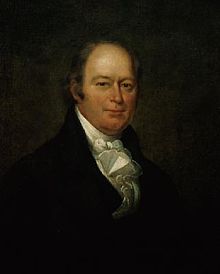
Back ويليام جونسون Arabic ويليام جونسون (قاضى) ARZ William Johnson (Richter) German William Johnson (juge) French ויליאם ג'ונסון HE William Johnson ID William Johnson (prawnik) Polish William Johnson (juiz) Portuguese
William Johnson | |
|---|---|
 | |
| Associate Justice of the Supreme Court of the United States | |
| In office May 7, 1804 – August 4, 1834 | |
| Nominated by | Thomas Jefferson |
| Preceded by | Alfred Moore |
| Succeeded by | James Moore Wayne |
| 11th Speaker of the South Carolina House of Representatives | |
| In office 1798–1800 | |
| Preceded by | Robert Barnwell |
| Succeeded by | Theodore Gaillard |
| Personal details | |
| Born | December 27, 1771 St. James Goose Creek Parish, South Carolina, British America |
| Died | August 4, 1834 (aged 62) New York City, New York, U.S. |
| Political party | Democratic-Republican |
| Spouse | Sarah Bennett (1794–1834) |
| Education | Princeton University (BA) |
| Signature | |
William Johnson Jr. (December 27, 1771 – August 4, 1834) was an American attorney, state legislator, and jurist who served as an Associate Justice of the Supreme Court of the United States from 1804 until his death in 1834. When he was 32 years old, Johnson was appointed to the Supreme Court by President Thomas Jefferson. He was the first Jeffersonian Republican member of the Court as well as the second Justice from the state of South Carolina. During his tenure, Johnson restored the act of delivering seriatim opinions. He wrote about half of the dissents during the Marshall Court, leading historians to nickname him the "first dissenter".
Johnson wrote the majority opinion for two major cases (including United States v. Hudson) and hundreds of majority opinions in minor admiralty, land, and insurance cases. He supported a strong federal government in economic matters, leading him to join the majority in cases such as McCulloch v. Maryland, Gibbons v. Ogden, and Fletcher v. Peck to the dismay of Jefferson and other Republicans.
Johnson's strong federalist opinions while sitting as a circuit justice for the District of South Carolina made him a social pariah in his home state. In 1834, he moved to Brooklyn, New York, where he died later that year from surgery complications. Like most justices on the Marshall Court, Johnson's contributions to the law were overshadowed by Chief Justice John Marshall. Beginning in the 1950s and 1960s, Johnson's jurisprudence became a topic of limited scholarship.
© MMXXIII Rich X Search. We shall prevail. All rights reserved. Rich X Search